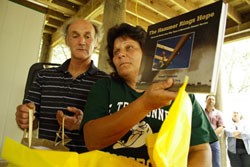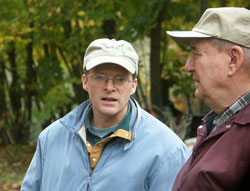 By Tim Shenk
By Tim Shenk
NEW ORLEANS – The leaders of five Anabaptist denominations visited Louisiana from Nov. 29 to Dec. 2 to learn about the ongoing struggles of communities affected by hurricanes Katrina and Rita and encourage the work of churches and aid organizations in the Gulf Coast region.
The nine-member Council of Moderators and Secretaries visited devastated New Orleans neighborhoods, worshipped with an Anabaptist congregation in nearby Metairie and attended the dedication of a house built by Mennonite Disaster Service (MDS) in the southern Louisiana community of Pointe-aux-Chenes.
They also met with pastors and aid workers and learned about the enormous challenges still facing Gulf Coast communities as a result of the 2005 hurricanes.
Hundreds of thousands of people who evacuated from New Orleans and other areas have not returned. In many cases, they continue to live in trailers or other temporary housing arrangements in unfamiliar communities far from their family members, churches and jobs.
Delays in restoring city services have slowed the return of evacuees, according to Tim Barr, Gulf Coast disaster response coordinator for Mennonite Central Committee (MCC). Additionally, many evacuees lack the basic resources they need to make the transition home.
“The hope is that a lot of people are going to come back to New Orleans, but the reality is that many people can’t,†Barr said.
Since the hurricanes, MDS has brought more than 5,000 volunteers from the U.S. and Canada to clean up and repair homes. MDS is now working toward long-term recovery by constructing houses for families whose homes were destroyed.
According to MDS, the house dedicated in Pointe-aux-Chenes may serve as a prototype for future houses in coastal southern Louisiana, where storm surges from Hurricane Rita caused great damage last year. The house was built on top of 11½-foot wooden supports to protect it from storm surges from nearby bayous.
The house was graciously accepted by the predominantly Native American community of Pointe-aux-Chenes and given to a family of four whose trailer was inundated by Rita.
Steve Swartz, general secretary of Conservative Mennonite Conference, said the house dedication was a highlight of the Council of Moderators and Secretaries’ visit.
“This was a priceless experience for me,†he said.
Swartz said his denomination has sent many volunteers to work on the Gulf Coast through MDS and he hopes these efforts will continue because of the great need.
MCC is helping Gulf Coast communities recover by supporting nine workers who are serving in churches and organizations that provide services to evacuees and returnees.
Lydia Weikel, an MCC caseworker in Meridian, Miss., described helping to connect evacuees with organizations and government programs that provide housing, employment and other needs. Weikel said that sometimes she is able to help evacuees find assistance that allows them to return to their home communities.
However, progress often seems slow because of the scale of the disaster, Weikel said.
“We see many, many sad situations and we’re not always able to help,†she said.
One of the ways the Church of the Brethren responded to Katrina was by providing child care at shelters and service centers for evacuees. Trained volunteers cared for more than 3,000 evacuee children in eight states in the weeks following Katrina, according to Roy Winter, executive director of the Church of the Brethren’s emergency response program.
The child care freed parents to take care of family needs and gave children a place to deal with traumatic experiences.
“Children need to be able to communicate and process what they’ve seen and experienced,†Winter said. “They actually communicate through their play.â€
Bob Zehr, a retired pastor in Gulf States Mennonite Conference, thanked MCC and MDS for their assistance to churches and communities in the Gulf Coast region but added that many needs remain.
Zehr said that many members of the congregations he attends, Lighthouse Fellowship in Plaquemines Parish, southern Louisiana, have not yet qualified for housing assistance for various reasons.
“MDS always does wonderful work and you can identify the buildings they have built,†Zehr said.
However, Zehr added that he fears that some people, such as those in his congregation, are “falling through the cracks.â€
Members of the council said Zehr’s comments prompted a helpful discussion of the channels for mutual aid within the church community and that they would continue to follow up on these concerns.
At Amor Viviente, a Gulf Coast Mennonite congregation in Metairie, La., members expressed gratitude for assistance provided in the wake of Katrina. Everyone in the congregation was forced to flee as Katrina approached and spent weeks or months in Texas, Florida or other parts of the country.
When they returned, many members found that their homes had been flooded and their household belongings were destroyed. MCC provided financial assistance to members of the congregation and pays the salary of a worker who helps church members find other assistance.
“You have been the arms of God for us,†said Josefina Gomez, a member of Amor Viviente, thanking all those who have helped the congregation. “You made us feel that God was with us. We were never alone.â€
The Council of Moderators and Secretaries is a gathering of the leaders of Mennonite Church USA, Church of the Brethren, Mennonite Brethren, Brethren in Christ and Conservative Mennonite Conference. The group meets annually to discuss common concerns among Anabaptist denominations.
The members of the Council of Moderators and Secretaries are Roy W. Williams, moderator of Mennonite Church USA; Steve Swartz, general secretary of Conservative Mennonite Conference; Ben W. Shirk, moderator of Conservative Mennonite Conference, Belita D. Mitchell, moderator of Church of the Brethren; Don McNiven, general secretary of Brethren in Christ; Warren Hoffman, moderator of Brethren in Christ, Joe E. Johns, chair of the leadership board of the U.S. Conference of Mennonite Brethren Churches, Stanley J. Noffsinger, general secretary of Church of the Brethren; and Jim Schrag, executive director of Mennonite Church USA.
Tim Shenk is a writer for Mennonite Central Committee.

 Editors note: Broome County, New York, particularly the Binghampton area is the home of numerous persons who attend Franconia Conference’s Lakeview congregation in Susquehanna County, PA.
Editors note: Broome County, New York, particularly the Binghampton area is the home of numerous persons who attend Franconia Conference’s Lakeview congregation in Susquehanna County, PA.